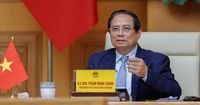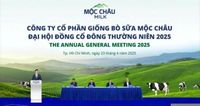Vietnam is actively restructuring its approach to foreign direct investment (FDI), focusing on quality and high technology. This insight was shared by various managers, experts, and investors at the "Nhịp cầu phát triển Việt Nam 2025" forum themed "Vietnam - FDI Strategy in the New Era," held on April 23, 2025.
From the investor's perspective, Nguyễn Bá Hùng, Chief Economist at the Asian Development Bank (ADB) Vietnam, emphasized that Vietnam remains an attractive destination for export-oriented FDI enterprises. Similarly, Nguyễn Hải Minh, representing the European Chamber of Commerce in Vietnam (EuroCham), highlighted Vietnam's significant advantages, including its geographical location, economic openness, diplomatic relations, cultural richness, and skilled workforce. In numerous surveys on business confidence conducted over the years, Vietnam consistently ranks among the top investment destinations.
As a result, investors are increasingly looking to Vietnam for their business endeavors. The country is evolving into a manufacturing hub and logistics center, complemented by various support services. During the period from 2026 to 2030, Vietnam aims to attract between $40 billion and $50 billion in FDI annually, with disbursed FDI reaching $30 billion to $40 billion each year.
Nguyễn Hồng Sơn, Deputy Head of the Central Policy and Strategy Department, noted that in the face of unpredictable global trade dynamics, Vietnam must adopt strategies to align with FDI flows in this new era. This includes a proactive restructuring of its FDI approach to emphasize quality and high-tech investments, positioning the country as a new production and transit center in the region.
In light of the challenging international landscape, Đỗ Thành Trung, Deputy Minister of Finance, acknowledged the significant achievements in attracting FDI but stressed the need to shift the focus towards high-tech sectors rather than medium technology and cheap labor. The Vietnamese government is implementing radical changes to its institutional framework to create a more favorable business environment, reduce costs, and introduce groundbreaking policies to stimulate economic growth.
Lym Dyi Chang, Director of Corporate Banking at UOB Vietnam, pointed out that the global investment landscape is shifting, and adaptability and long-term competitiveness will determine success. Within the broader ASEAN context, Vietnam is not only a destination for investment but also a strategic link in the regional value chain. To enhance its long-term competitiveness, Vietnam must transition from merely receiving investments to co-creating value.
To become a strategic FDI hub, Chang recommended that Vietnam invest in developmental foundations rather than relying solely on preferential policies. This includes stable legal frameworks, effective public-private partnerships in workforce development and innovation, a robust financial ecosystem, a growing middle class, and a clear commitment to sustainable development alongside a flexible legal framework for the digital economy.
Nguyễn Anh Tuấn, Deputy Director of the Foreign Investment Agency, reiterated the enduring relevance of the solutions outlined in Resolution 50-NQ/TW. He emphasized the importance of connecting the FDI sector with the domestic economy, not just through selective and quality-driven investments but also by leveraging foreign investments to bolster domestic economic growth.
In addition to the three breakthroughs in institutional reform, human resources, and infrastructure, Tuấn highlighted the critical need to maintain foreign investors' confidence. This involves addressing institutional bottlenecks and creating a transparent investment environment with predictable policies and innovative solutions to foster a new growth model.
For foreign investors to remain in Vietnam, their perception of the country is crucial. If they see Vietnam merely as a rental home, they are unlikely to invest heavily or transfer technology. However, if they view it as a second home, they are more likely to share a common vision and contribute significantly to Vietnam's development.
To enhance connectivity between foreign investors and domestic enterprises, Nguyễn Bá Hùng noted that export-oriented companies face challenges in linking with local firms due to pre-existing production chains. Vietnamese companies seeking collaboration must integrate into these chains and meet operational standards. This presents a significant challenge that requires support programs to help local businesses meet the necessary criteria for participation in production chains.
On the environmental front, Prime Minister Phạm Minh Chính attended a high-level online conference on climate action the same day, underscoring the importance of addressing climate goals as a historic mission. He stated, "We are inheriting the Earth from previous generations and borrowing it from future generations." This conference was held ahead of the 30th Conference of the Parties to the United Nations Framework Convention on Climate Change (COP30) in Brazil later this year, with participation from 16 heads of state and government.
During the conference, the Prime Minister reiterated that climate change is a harsh reality affecting all nations and peoples. However, current climate actions fall short of the goals set by the Paris Agreement, particularly regarding climate finance and greenhouse gas emission commitments. To effectively tackle these challenges, he emphasized the need for a new, comprehensive, and inclusive global approach, along with enhanced determination, effort, and decisive action.
He called for all nations to cooperate, uphold multilateralism, ensure fairness and justice, and work together with specific and feasible cooperation mechanisms. The Prime Minister highlighted Vietnam's commitment to achieving carbon neutrality by 2050, despite being a developing country with limited resources.
Vietnam is making strides in establishing the necessary institutional frameworks for green transformation, including national planning, energy master plans, and strategies for key industry development. These frameworks aim to support vulnerable sectors and communities affected by climate change.
Despite being a developing nation, Vietnam has made positive progress in renewable energy supply within ASEAN, gaining international recognition for promoting sustainable green agriculture. The Prime Minister urged international partners to focus on supporting Vietnam through financial assistance, sharing advanced technologies, training human resources, and enhancing governance frameworks. Such support will help Vietnam realize the goals of the Paris Agreement and ensure a sustainable future for generations to come.


